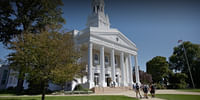The Department of History has three paramount aims for its undergraduates, whether they are majors, minors, or students in the required core courses.
First, we foster an appreciation for studying the past for its own sake, in all its variety, ambiguity, and strangeness. To this end, each course emphasizes the exploration and interpretation of primary sources, the raw materials with which historians construct the narrative of the past.
Second, the faculty aims to help students understand that the past has shaped the present. We ask them to participate in the never-ending dialogue between the past and the present by encouraging them to explore difficult questions: What happened? Why did it happen? What were the consequences? What were the dominant values and the dissident voices? How did different cultures and societies interact? How did contemporaries and later generations differ in interpreting events? What are the context and meaning of the changes that have occurred in business, medicine, economics, politics, religion, culture, urban affairs, and gender and race relations? After exposure to these questions, students enter the world personally enriched and better equipped for whatever profession they choose.
Third, the department understands its role in educating students for effective membership and leadership in a global political, social, and economic community by providing an historical understanding of the major world cultures. In courses that range from ancient to modern times, from Asia to New York City, and from the history of women to African-American history, we try to contextualize the world for students.











